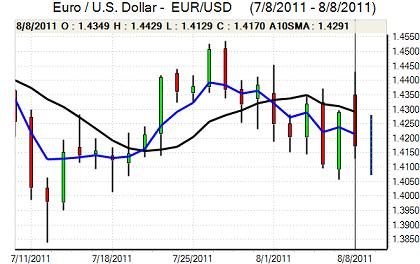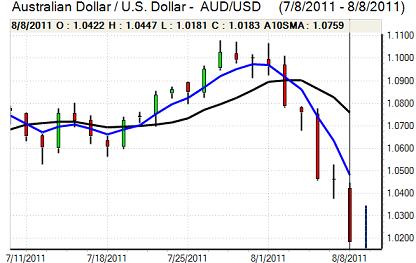EUR/USD
The Euro was unable to regain the 1.44 level in European trading on Monday and then came under heavy selling pressure as volatility remained extremely high amid weakness in equity markets.
The ECB confirmed that it has bought Italian and Spanish bonds in the secondary market which continued to have an important impact in easing bond-market tensions in these countries. There was a sharp decline in Italian and Spanish 10-year benchmark yields with a decline of around 100 basis points to below 5.50%.
There were still very important underlying stresses and an increase in French credit-default swaps to record highs as there were further concerns that France could lose its AAA credit rating.
The ECB also continued to insist that its buying of the bonds was a short-term solution and that there would need to be a political deal to increase the EFSF facility. There were, however, further doubts surrounding the German political situation with continued resistance to any early move to increase the fund. There were signs of increased opposition to any increase in funding within the governing CDU and FDP parties.
There were no major US economic releases during the day with markets focussed on the severe stresses on Wall Street. The major stock indices came under heavy selling pressure with the Dow Jones industrial average falling by over 6%, the sharpest one-day decline since late 2008 and there was a further flow of defensive funds into US Treasuries despite the credit-rating downgrade.
The Euro weakened to lows below 1.4150 as stock-market selling pressure intensified before a recovery back to above 1.42 as there was still a fundamental lack of confidence in the dollar.

Source: VantagePoint Intermarket Analysis Software
Call now and you will be provided with FREE recent forecasts
that are up to 86% accurate * 800-732-5407
If you would rather have the recent forecasts sent to you, please go here
Yen
The dollar was unable to regain the 78 level during Monday and the Japanese currency was subjected to renewed gains in Asia on Tuesday as Wall Street and regional bourses fell sharply. There was further safe-haven demand for the yen as risk appetite deteriorated and the higher than expected Chinese inflation data also triggered defensive demand for the Japanese currency as growth fears increased.
The dollar did spike briefly on speculation that there had been further intervention, but it appeared to be private buying. Bank of Japan Shirakawa continued to warn that central bank was ready to act if needed. There was also further speculation over a concerted G7 move to stabilise markets which curbed yen buying to some extent.
Sterling
Sterling hit resistance above 1.6450 against the dollar during Monday and weakened steadily during the day with lows just above 1.6250 as the US currency gained safe-haven support. The Euro was unable to move above the 0.8750 area against the UK currency.
There was some negative Sterling impact from further rioting in London, especially as there were reports of violence in other major UK cities.
As far as economic data is concerned, the latest RICS house-price index recorded a slight improvement to -22% in July from -26% previously while the latest BRC report recorded a 0.6% like-for-like annual increase in sales compared with a 0.6% decline previously.
Underlying confidence in the economy will remain very fragile with the Bank of England likely to take a downbeat view in Wednesday’s inflation report, especially as a weaker Euro-zone will have an important negative impact.
There was still some defensive support from fears over the Euro-zone outlook, but Sterling will be subjected to heavy selling pressure if confidence in the banking sector deteriorates.
Swiss franc
After finding support near 0.7650 against the dollar during Monday, the franc surged to fresh record highs beyond 0.75 during the New York session as equity markets were subjected to further heavy selling. The Euro also weakened sharply to record lows near 1.06 as there was further defensive franc demand before a partial correction as Asian equity markets looked to stabilise.
The franc continued to gain defensive support as fear dominated, while domestic concerns increased. The government held another round of emergency talks to discuss the situation and there are likely to be further policy announcements during Tuesday as stresses within the industrial sector intensify.

Source: VantagePoint Intermarket Analysis Software
Call now and you will be provided with FREE recent forecasts
that are up to 86% accurate * 800-732-5407
If you would rather have the recent forecasts sent to you, please go here
Australian dollar
The Australian dollar found support close to 1.03 during the European session on Monday, but a fragile correction was undermined by a sharp decline on Wall Street and the Australian dollar was subjected to extremely strong selling pressure from late in New York. With stop-losses also being triggered, the currency weakened to five-month lows below parity before rallying back to above 1.0150 as volatility remained intense.
There were further fears over the global growth outlook which compounded the impact of risk aversion from falling equity markets. Domestically, there was little change in the latest NAB business confidence index while new home loans were unchanged for June.



